What is the ideal weight of a weighted blanket?
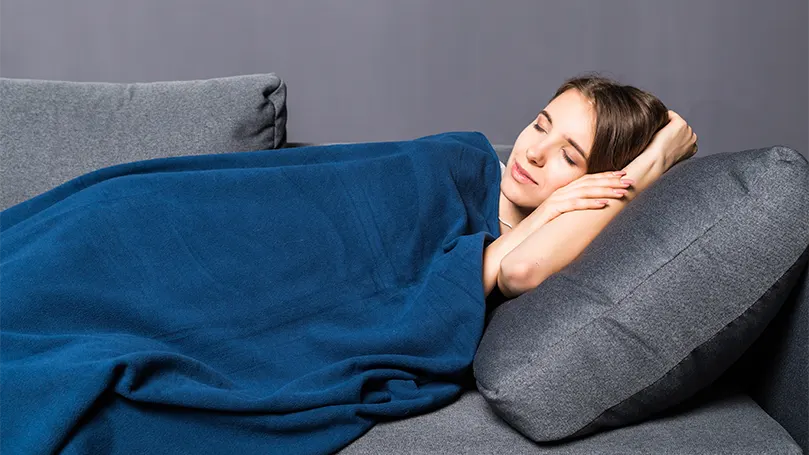
It is said that best weighted blankets weigh around 10% of your own body weight. For instance, if you weigh 160 lbs should get an 16 lb weighted blanket.
The 10% rule is not set in stone, however, and you may need to adjust the weight of your blanket according to your individual needs. For example, you may benefit from a heavier blanket if you are particularly anxious or have a more severe sensory processing disorder. [1]
Conversely, if you are on the smaller side or are looking for a lighter option to use during the summer months, you may want to go for a lighter blanket.
The bottom line is that there is no one-size-fits-all answer when it comes to the ideal weight of a weighted blanket. It really depends on your individual needs and preferences.
What's the heaviest weighted blanket you should use?
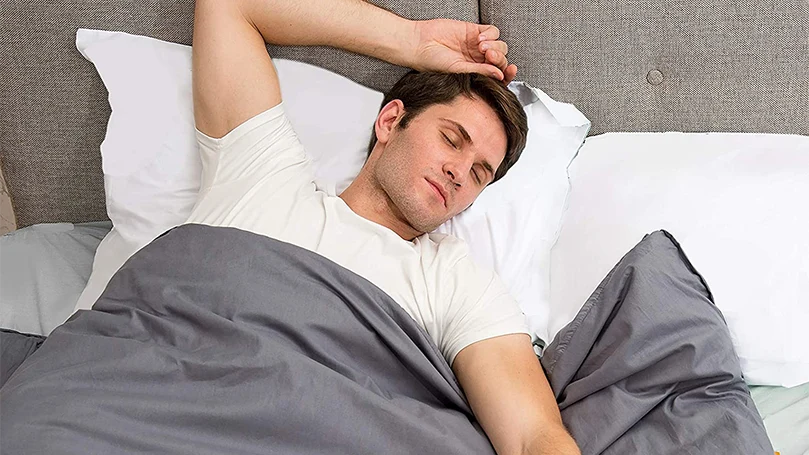
Is there such thing as a blanket that's too heavy?
While there is no definitive answer, most experts agree that the heaviest weighted blanket should not exceed 10% of your body weight.
However, a study conducted in 2008 claims otherwise. [2]
A study performed on 30 adults, all in great health, concluded that resting under a 30-pound weighted blanket for 5 minutes caused no adverse effects on their vital signs.
The participants were monitored for changes in blood pressure, heart rate, and oxygen saturation levels. Results showed that there were no significant changes in any of the vital signs.
The study did have some limitations, though, such as the small sample size and the fact that it was only done on adults in good health, but it does suggest that “very” heavy blankets may be safe for use.
Are weighted blankets safe in general?

With all that we know so far, it's safe to say that most weighted blankets are very safe to fall asleep under.
There have been no reports of serious injuries or deaths related to weighted blankets – to adults. However, two deaths have been linked to the misuse of weighted blankets – one of a 9-year-old boy and one of a 7-month-old baby. [3] However, in both cases, there was gross misuse involved.
This is why it's important to make sure that the blanket weight does not exceed 10% of your body weight. If you're unsure, it's always better to err on the side of caution and go for a lighter option.
n conclusion, weighted blankets are generally safe for use, but it's important to choose one that is the right weight for you or your loved one.
Make sure to consult with a doctor or therapist or just listen to your own body if you're unsure about which weight is best for you.
Why should you stay away from the heaviest weighted blanket?
There's only so much weight that a human body can take before deep touch pressure therapy becomes just too much.
Here's why you should avoid the heaviest blankets.
Less comfort
This won't apply to everyone but if you're looking for a cosy, comfortable night's sleep, you might want to avoid the heaviest blankets.
They can be quite overwhelming and even make it difficult to move around in bed, which can be a nuisance if you're a squirmy sleeper.
Heavier weighted blankets are also not ideal for use during the summer months as they can make you feel quite hot and sweaty, even if you keep yours in a very breathable duvet cover.
Potentially dangerous
In theory, sleeping under weighted blankets that are too heavy for you could be dangerous.
If the weight of the blanket is too much for your body to handle, it could cause difficulty breathing or even cause you to suffocate.
Of course, this is only a risk if you choose a blanket that is way too heavy for you.
And, apart from two gross mistakes by caretakers causing children to die, no deaths or serious injuries were ever linked with these blankets.
How to find the perfect weighted blanket for yourself?
We've already spoken about the 10% rule, but that's not all there is to a weighted blanket.
Different materials, different weights and different sizes all contribute to the perfect weighted blanket for you. Some couples may prefer Queen-size weighted blankets and others might like sleeping under separate, smaller weighted blankets.
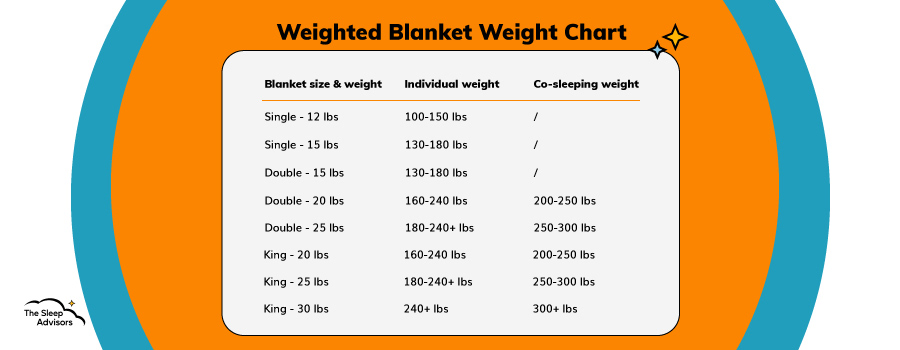
Fill & material
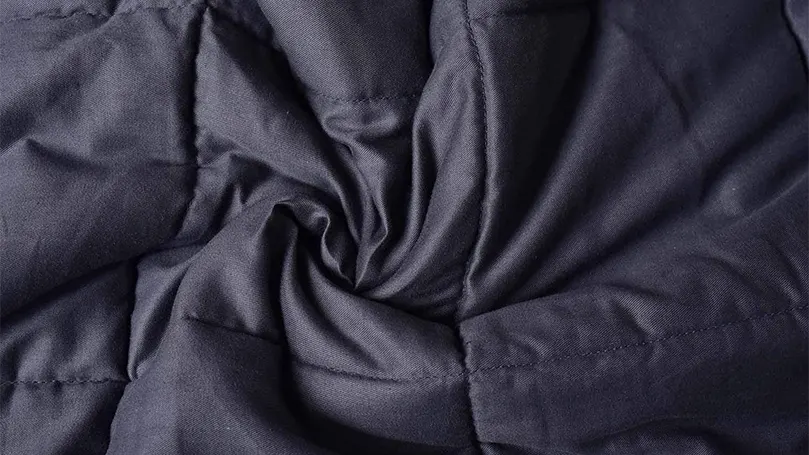
To keep weight evenly distributed, your blanket should have small, evenly distributed pellets or beads. The most common filling is glass beads as they're non-toxic, hypoallergenic and don't make too much noise when you move around in bed. However, it's not the only one.
You can also find weighted blankets with plastic, steel or ceramic beads. And some companies even use rice or sand – although this is not a common practice.
Cover
As for the cover, as long as it's quilted and has a tight stitch, you're good to go. As we've said, evenly distributed weight is key, so make sure to check that the pellets or beads are not moving around freely, causing the weight to be uneven.
Also, you'll want something breathable to avoid feeling too hot and sweaty during the night. A breathable cotton cover should do the trick.
Washing & maintenance
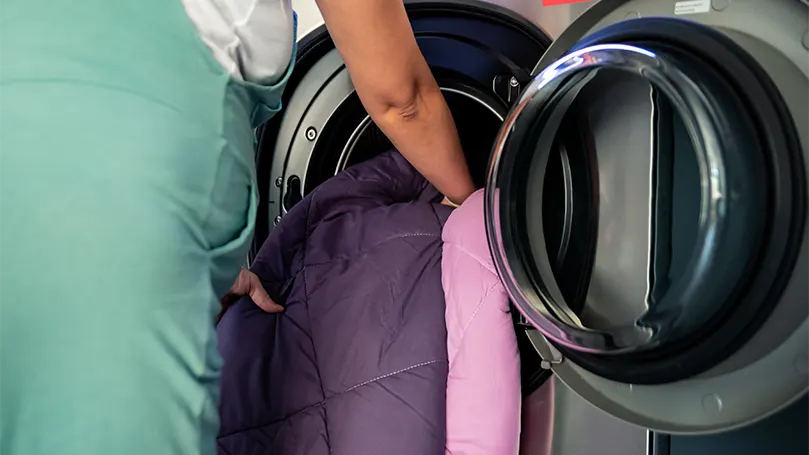
Just like any other type of bedding, weighted blankets need to be cleaned on a regular basis. Most are machine-washable, at least most of the ones filled with micro glass beads and plastic pellets, but some require dry cleaning.
Our advice is to use a removable cover to keep the blanket itself as clean as possible for as long as possible because they're not easy to clean.
Related reading:
Eco-friendly & hypoallergenic
Finally, you'll want to make sure that your weighted blanket is eco-friendly and hypoallergenic.
As we've said, glass pellets are a good option as they're eco-friendly and hypoallergenic. However, if you're looking for an alternative, you can also find weighted blankets filled with steel, plastic or ceramic beads.
Can I sleep with a weighted blanket every night?
Despite what many will have you believe, sleeping under a weighted blanket every night is a good idea. So, yes it's okay to sleep with a weighted blanket every night. In fact, it's perfectly safe to do so.
However, if you feel like your body needs a break from the deep touch pressure therapy that these blankets provide – take one.
There's no need to use a weighted blanket every single night if you don't want to. Just like there's no need to use one at all if you don't want to.
But, if you find that sleeping with a weighted blanket improves your sleep quality, then there's no harm in using it every night.
When should you not use a weighted blanket?
No matter the weight or size, weighted blanket is not for everyone. There are certain conditions and situations when using a weighted blanket is not advised. If you have any of the following conditions, you should refrain from using a weighted blanket:
- Asthma
- Claustrophobia
- Respiratory conditions
- Circulatory issues
- Low blood pressure
- Type-2 Diabetes
- OSA.
What happens when your weighted blanket is too heavy?
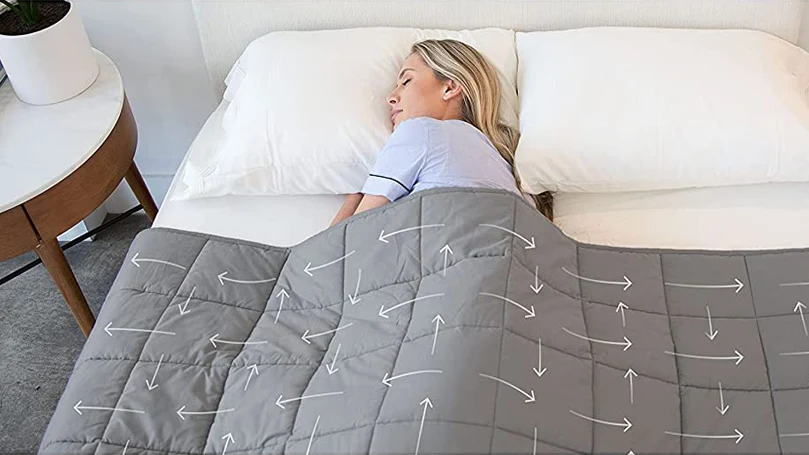
As we've said earlier, blanket weights are important. And, choosing the right weight is key to a good night's sleep.
But, what happens if your weighted comforter or blanket is too heavy?
A weighted blanket that is too heavy can actually have the opposite effect of what you're looking for.
Instead of providing deep pressure therapy that relaxes the body and mind and leads to quality sleep, it can cause anxiety and restlessness and have you feeling trapped.
Additionally, a significant rise in body temperature can lead to night sweats, which is the last thing you want when you're looking to get a full night of restful sleep.
Will a weighted blanket that is too light for me have any function at all?
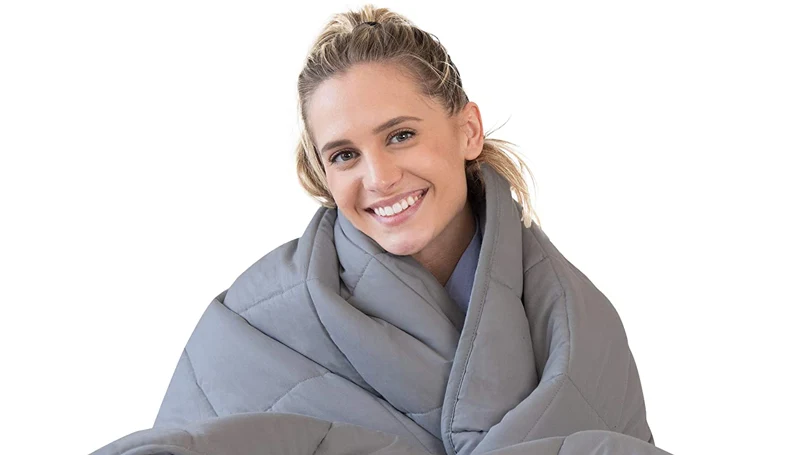
We already know the recommended weight for the best weighted blanket. And, we already know what happens if the blanket is too heavy. But, what if it is too light?
Well, the jury's still out on this one.
Some say that a weighted blanket that is too light and offers gentle pressure will have no effect whatsoever.
We feel like it's up to your personal preference.
If you find that a light blanket provides the level of hugging feeling you need to relax, then by all means – go for it.
The goal is to find a heavy blanket that works for you – not one that meets some sort of industry standard.
Conclusion
And that's all you have to know about picking out the perfect weighted blanket weight! So, make sure not to get the heaviest weighted blanket around if it's too heavy for you! But don't make it too light either. And if you have any questions about weighted blankets, make sure to leave them in the comments.
Spread the word
References & resources
- Weighted Blankets and Sleep Quality in Children with Autism Spectrum Disorders: A Single-Subject Design
- Exploring the Safety and Therapeutic Effects of Deep Pressure Stimulation Using a Weighted Blanket
Related products:













There are no comments yet
"*" indicates required fields